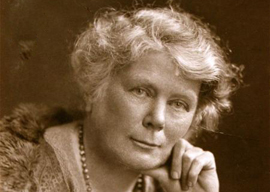
January 13, 2018

Mary Neal
Source: maryneal.org
While researching a book recently, I came across the figure of Max Plowman, a minor writer of the 1910s, ’20s, ’30s, and very early ’40s (he died in 1941). His name rang with me the very faintest of bells, though I could not have said why. He is now largely forgotten, as almost everyone who puts pen to paper, or finger to keyboard, is bound soon to be; but I came to esteem him.
He was many things I might normally be inclined to mock; for example, he was spiritual without being religious, faintly mystical as well as socialist, and he ran a commune. He was a persistent evangelist for the lost cause of pacifism. But he had earned his pacifism, as it were: He had served in the Battle of the Somme during the Great War and in 1927 published a memoir about it, A Subaltern on the Somme. It is surely understandable that anyone who participated in that great slaughter should have come to the conclusion that war was the worst of all evils.
Plowman was patently a good man, and in these days, when we are all too inclined to attribute the worst of motives to those with whom we disagree, it is well to remember that a man may be good whose opinions seem to us mistaken, even grossly so. If nothing else, it would serve to calm us down a little.
For many years, he edited a literary monthly called The Adelphi, of high quality if somewhat earnest in tone. Humor was not its strongest suit, but it drew contributions from people as considerable as George Orwell and Aldous Huxley, and survived for years without advertising, from subscriptions alone.
Last week I came across the edition for April 1940, not a high point for pacifism, which it was still strongly advocating. It is true that the war had not yet entered its most cataclysmic stage, but still it seems to me a tribute to the genuine liberalism of the times that, in such a moment of national emergency, people should still have been able to argue for a policy directly contra that of the government, without any hindrance or persecution. There are now many subjects on which intellectuals would face more persecution in practice, especially in universities, if they challenged received opinions, than Plowman faced from the government in the midst of a war.
The issue apologized on its front cover for the increase in its price—“owing to the enormous increase in the cost of paper and printing”—to the equivalent of about 20 U.S. cents, an unintended but eloquent testimony nearly eighty years later to the magnitude of the depreciation of all currencies, even the most supposedly solid.
One of the main articles in the magazine is titled “A Victorian Childhood” by Mary Neal (1860–1944), who, I have been able to discover thanks to the glories of the internet, was a pioneer collector of folk songs (she jointly authored a book of them in 1915) and social worker. She sounds to me as if she went in for the kind of muddy mysticism that would have appealed to Plowman, but her article is a short account of a childhood as the daughter of a prosperous manufacturer. Short as it is, it is instructive:
There has never been, nor I think can there ever be, quite the same cleavage between the generation of which I write and that of to-day.
Her own childhood was one of “the thickest fog of unreality,” in which hypocrisy and mere appearance were predominant, contrasted with “the great awakening today”:
The cry to-day is for reality, reality, and ever more reality, in family life, in business life, in social life, and more than anything else in religious life.
In contrast to her own childhood, 1940 was some kind of golden age for, or of, young people:
Today, we are out for reality, no matter how painful that reality may be. We want to know what are the real values. We want to know the truth about family relationships, the truth about relations between men and women, the truth about economic relationships, and we seek remedies for poverty, sickness and mental stress and strain, even if those remedies upset all preconceived ideas of right and justice…. And I believe that the reckless, pleasure-seeking morality of to-day is only a symptom of this impossibility of sitting down to accept the present state of things.